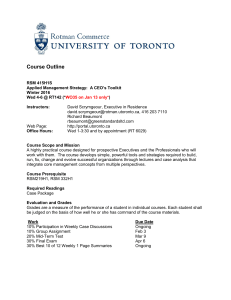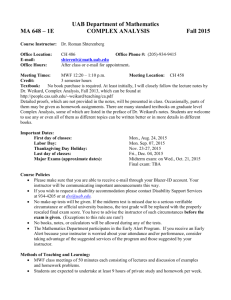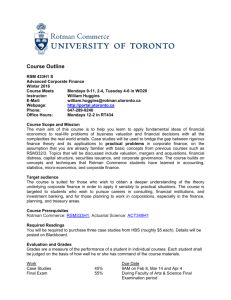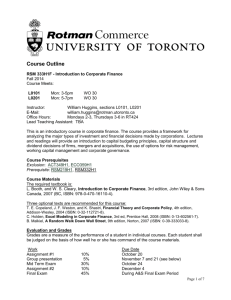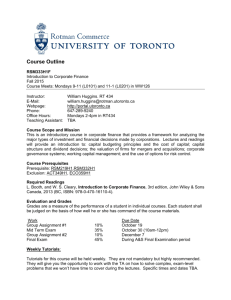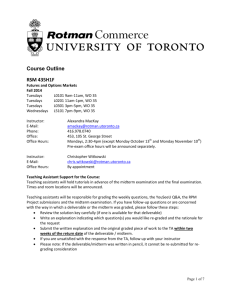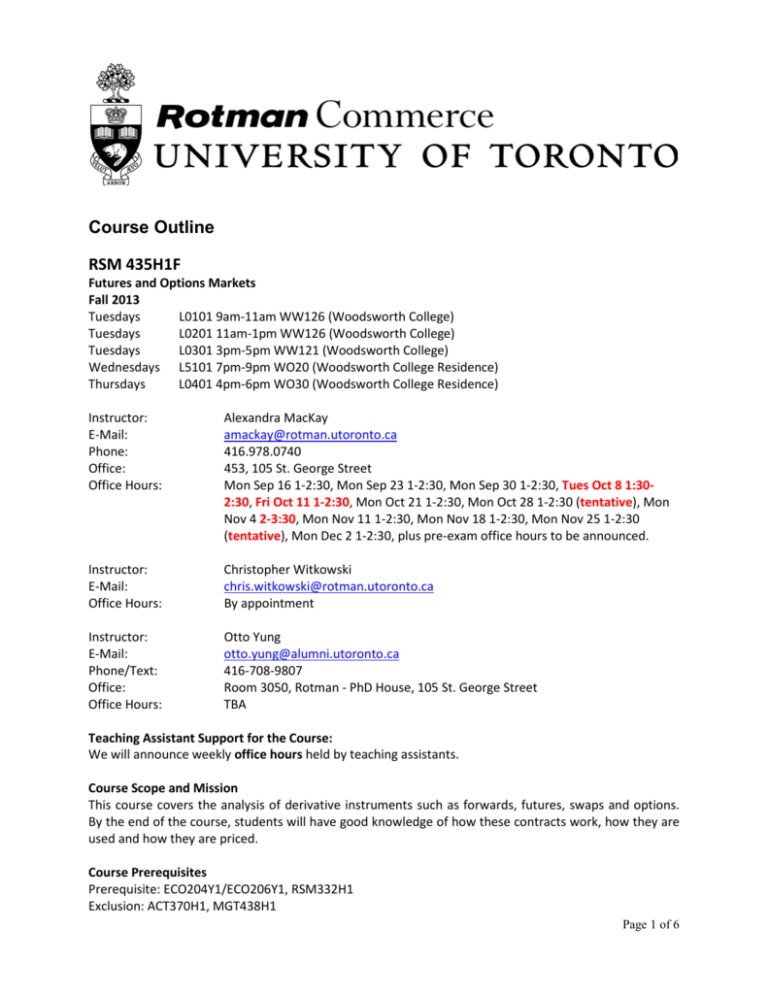
Course Outline
RSM 435H1F
Futures and Options Markets
Fall 2013
Tuesdays
L0101 9am-11am WW126 (Woodsworth College)
Tuesdays
L0201 11am-1pm WW126 (Woodsworth College)
Tuesdays
L0301 3pm-5pm WW121 (Woodsworth College)
Wednesdays L5101 7pm-9pm WO20 (Woodsworth College Residence)
Thursdays
L0401 4pm-6pm WO30 (Woodsworth College Residence)
Instructor:
E-Mail:
Phone:
Office:
Office Hours:
Alexandra MacKay
amackay@rotman.utoronto.ca
416.978.0740
453, 105 St. George Street
Mon Sep 16 1-2:30, Mon Sep 23 1-2:30, Mon Sep 30 1-2:30, Tues Oct 8 1:302:30, Fri Oct 11 1-2:30, Mon Oct 21 1-2:30, Mon Oct 28 1-2:30 (tentative), Mon
Nov 4 2-3:30, Mon Nov 11 1-2:30, Mon Nov 18 1-2:30, Mon Nov 25 1-2:30
(tentative), Mon Dec 2 1-2:30, plus pre-exam office hours to be announced.
Instructor:
E-Mail:
Office Hours:
Christopher Witkowski
chris.witkowski@rotman.utoronto.ca
By appointment
Instructor:
E-Mail:
Phone/Text:
Office:
Office Hours:
Otto Yung
otto.yung@alumni.utoronto.ca
416-708-9807
Room 3050, Rotman - PhD House, 105 St. George Street
TBA
Teaching Assistant Support for the Course:
We will announce weekly office hours held by teaching assistants.
Course Scope and Mission
This course covers the analysis of derivative instruments such as forwards, futures, swaps and options.
By the end of the course, students will have good knowledge of how these contracts work, how they are
used and how they are priced.
Course Prerequisites
Prerequisite: ECO204Y1/ECO206Y1, RSM332H1
Exclusion: ACT370H1, MGT438H1
Page 1 of 6
Required Readings
Hull, John C.,Options, Futures, and Other Derivatives, 8th Edition, Pearson-Prentice Hall, 2012.
Hull, John C., Student Solutions Manual for Options, Futures, and Other Derivatives, 8th Edition, PearsonPrentice Hall, 2012.
Evaluation and Grades
(Note: Assignments and Lab Cases can be submitted in class as well)
(Note: Please attach a cover page to your course work submission. The template will be on the portal.)
Grades are a measure of the performance of a student in individual courses. Each student shall be judged
on the basis of how well s/he has command of the course materials.
Work
Assignment #1
Finance Lab Case #1
Midterm Examination
Assignment #2
Finance Lab Case #2
Final Exam
10%
0% or 10%
25%
10%
0% or 10%
45%
Due Date
by 4pm October 17th (Commerce Office)
by 4pm October 17th (Commerce Office)
October 23rd
by 4pm December 3rd (Commerce Office)
by 4pm December 3rd (Commerce Office)
During the Faculty of Arts & Science Final
Examination period, December 9-20
Whichever Finance Lab Case has a higher grade will be worth 10% of your overall grade in the course.
The midterm and final examinations will not be open book. You will be permitted to bring in a calculator
and an 8.5′′×11′′ one-sided “aid sheet” with notes and/or formulae to the midterm examination, and a
calculator and an 8.5′′×11′′ two-sided “aid sheet” with notes and/or formulae to the final examination.
You are allowed to work in groups on the assignments, but you must independently write up your own
assignment and submit work that is your own.
The BMO Financial Group – Finance Research and Trading Lab
The Finance Lab is located in the Rotman building, 105 St George St, 2nd floor. You may access the
Finance Lab during regular business hours, provided it is not booked for a class. On your course webpage
you will find information on how to check the Finance Lab schedule and detailed online help regarding
Finance Lab resources available. Lab assistants are available to answer questions Monday through Friday,
9am to 5pm. They can help you learn to use the Finance Lab resources, but they will not provide answers
to lab-related assignment questions.
Your class in week 4 (October 1/2/3) will be in the Finance Lab during class time. You are asked to attend
a 1 hour session in the Finance Lab outside class time during the week of November 4th. This session will
help you to be ready for Finance Lab Case #2. The dates/times of these sessions are:
• Monday November 4th, 7-8pm
• Tuesday November 5th, 5-6pm
• Thursday November 7th, 7-8pm
• Friday November 8th, 5-6pm
Page 2 of 6
Weekly Schedule
Session
Topic
Readings
#1 – September 10/11/12
Introduction,
Mechanics of Futures Markets,
Hedging Strategies Using Futures
Chapters 1, 2 and 3
#2 – September 17/18/19
Interest Rates
Chapter 4
#3 – September 24/25/26
Determination of Forward and Futures
Prices
Chapter 5
Assignment 1 will be posted on Monday September 30th
#4 – October 1/2/3
Session in BMO Financial Group –
Finance Research and Trading Lab*
RIT Case
#5 – October 8/9/10
Interest Rate Futures
Chapter 6
Tutorials available during the week of October 15th – see portal for dates/times/locations
Assignment 1 and Finance Lab Case #1 due on or before 4pm October 17th for ALL sections
#6 – October 15/16/17
Interest Rate Futures (cont’d)
#7 – October 23
Midterm Examination
7-9pm, Wed Oct 23rd
ALL SECTIONS
#8 – October 29/30/31
Swaps
Chapter 6
Chapter 7
Monday, November 4th (Last Day to Withdraw)
Please attend a 1 hour session in the FRTL at a non-class time during the week of November 4-8. Dates and
times for available sessions will be announced on the portal. (This 1 hour session is to prepare you for Finance
Lab Case #2.)
#9 – November 5/6/7
Properties of Options
Trading Strategies Involving Options
Chapters 9, 10 and 11
November Break (No Classes) (Monday, November 11th to Tuesday, November 12th)
Assignment 2 will be posted Monday November 11th
#10 – November 19/13/14
#11 – November 26/20/21
Binomial Trees
Chapter 12 (excl. Appendix)and
17.6
The Black-Scholes Merton Model
Chapter 14 (excl. 14.6 and
Appendix)
Page 3 of 6
Assignment 2 and Finance Lab Case #2 due on or before 4pm December 3rd for ALL sections
#12 – December 3/November
27/28
The Greeks
Chapter 18
Tutorials available during the week of December 2nd – see portal for dates/times/locations
FINAL EXAM (TBA - Exam Period - December 9th to 20th)
*The Finance Lab session date(s) may change in cases of scheduling conflict.
POLICY AND PROCEDURE
Missed Tests and Assignments (including the midterm examination)
Students who miss a test or assignment for reasons entirely beyond their control (e.g. illness) may
submit a request for special consideration. Provided that notification and documentation are supplied in
a timely manner, and that the request is subsequently approved, no academic penalty will be applied.
In such cases, students must notify Rotman Commerce on the date of the missed test (or due date in the
case of course work) and submit supporting documentation (e.g. Verification of Student Illness or Injury
form) to the Rotman Commerce Program Office within one week of the originally scheduled test or due
date. Students who do not provide Rotman Commerce or the instructor with appropriate or sufficient
supporting documentation will be given a grade of 0 (zero).
Note that the physician’s report must establish that the patient was examined and diagnosed at the
time of illness, not after the fact. Rotman Commerce will not accept a statement that merely confirms
a report of illness made by the student and documented by the physician.
For missed assignment #1, the weight will be shifted to the midterm examination; for missed assignment
#2, the weight will be shifted to the final examination. For missed midterm examination, the weight will
be shifted to the final examination. For missed Finance Lab Case #1, Finance Lab Case #2 will be worth
10%. For missed Finance Lab Case #2, Finance Lab Case #1 will be worth 10%. If both Finance Lab Cases
are missed, the weight will shift to the final examination.
Late Assignments
Assignments are due as noted in the schedule above. Assignments may be submitted in class or to the
Commerce Office. Late submissions will not be accepted. Students who, for reasons beyond their
control, are unable to submit an assignment by its deadline must obtain approval from the instructor for
an extension. Please note that extensions will not be granted once the solution key has been posted.
Supporting documentation will be required as per the policy on missed tests and assignments.
Accessibility Needs
The University of Toronto is committed to accessibility. If you require accommodations for a disability, or
have any accessibility concerns about the course, the classroom or course materials, please contact
Accessibility
Services
as
soon
as
possible:
disability.services@utoronto.ca
or http://www.accessibility.utoronto.ca/.
Academic Integrity
Academic Integrity is a fundamental value essential to the pursuit of learning and scholarships at the
University of Toronto. Participating honestly, respectively, responsibly, and fairly in this academic
community ensures that the U of T degree that you earn will continue to be valued and respected as a
Page 4 of 6
true signifier of a student's individual work and academic achievement. As a result, the University treats
cases of academic misconduct very seriously.
The University of Toronto’s Code of Behaviour on Academic Matters
http://www.governingcouncil.utoronto.ca/policies/behaveac.htm outlines the behaviours that constitute
academic misconduct, the process for addressing academic offences, and the penalties that may be
imposed. You are expected to be familiar with the contents of this document. Potential offences include,
but are not limited to:
In papers and assignments:
• Using someone else's ideas or words without appropriate acknowledgement.
• Submitting your own work in more than one course without the permission of the instructor.
• Making up sources or facts.
• Obtaining or providing unauthorized assistance on any assignment (this includes collaborating
with others on assignments that are supposed to be completed individually).
On tests and examinations:
• Using or possessing any unauthorized aid, including a cell phone.
• Looking at someone else's answers.
• Misrepresenting your identity.
• Submitting an altered test for re-grading.
Misrepresentation:
• Falsifying institutional documents or grades.
• Falsifying or altering any documentation required by the University, including (but not limited
to), medical notes.
All suspected cases of academic dishonesty will be investigated by the following procedures outlined in
the Code of Behaviour on Academic Matters. If you have any question about what is or not is permitted
in the course, please do not hesitate to contact the course instructor. If you have any questions about
appropriate research and citation methods, you are expected to seek out additional information from
the instructor or other UofT resources such as College Writing Centres or the Academic Success Centre.
Email
At times, the course instructor may decide to communicate important course information by email. As
such, all UofT students are required to have a valid UTmail+ email address. You are responsible for
ensuring that your UTmail+ email address is set up AND properly entered on the ROSI system. For more
information please visit http://help.ic.utoronto.ca/category/3/utmail.html
Forwarding your utoronto.ca email to a Hotmail, Gmail, Yahoo or other type of email account is not
advisable. In some cases, messages from utoronto.ca addresses sent to Hotmail, Gmail or Yahoo
accounts are filtered as junk mail, which means that important messages from your course instructor
may end up in your spam or junk mail folder.
Blackboard and the Course Page
The online course page for this course is accessed through Blackboard. To access the course page, go to
the UofT Portal login at https://portal.utoronto.ca/ and log in using your UTORid and password. Once
you have logged in, look for the My Courses module where you’ll find the link to all your course websites.
If you don’t see the course listed here but you are properly registered for the course in ROSI, wait 48
hours. If the course does not appear, go to the Information Commons Help Desk in Robarts Library, 1st
Page 5 of 6
floor, for help, or explore the Portal Information and Help at www.portalinfo.utoronto.ca/students and
review the Frequently Asked Questions.
Recording Lectures
Lectures and course materials prepared by the instructor are considered by the University to be an
instructor’s intellectual property covered by the Canadian Copyright Act. Students wishing to record a
lecture or other course material in any way are required to ask the instructor’s explicit permission, and
may not do so unless permission is granted (note: students who have been previously granted
permission to record lectures as an accommodation for a disability are, of course, excepted). This
includes tape recording, filming, photographing PowerPoint slides, Blackboard materials, etc.
Page 6 of 6


